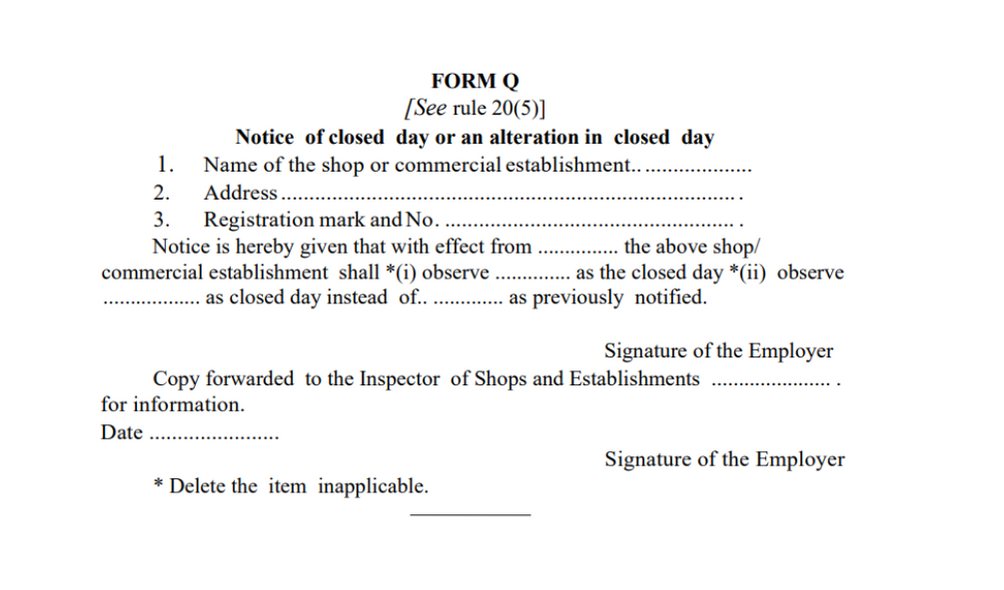The Shops and Establishment Act initiated and enforced to secure the rights and privileges of the employees is applicable to all businesses and commercial establishments across India that fall under the Shops and Establishments Act. It includes hotels, warehouses, stores, eateries, amusement parks, theatres, and so on.
The Madhya Pradesh Commercial Establishment Act lays down the rules for the employers in businesses to which the Act applies. Businesses have days on which they do not serve their customers and do not conduct any business, termed closed days; these ‘closed days’ must be clearly communicated through a shop closed notice to everyone involved. This brings forth the significance of Madhya Pradesh Form Q notice of closed day or alteration in a closed day. It is a form that applies to all the commercial complexes and shops in the state of Madhya Pradesh.
We shall be walking through the format of the form and the details it involves. Here is what we shall learn:
- What is Madhya Pradesh Form Q notice of closed day or alteration in closed day?
- Associated Compliances
- Madhya Pradesh Shops Act: An Overview
- How can Deskera help You?
- Key Takeaways
- Related Articles
What is Madhya Pradesh Form Q notice of closed day or alteration in closed day?
Form Q which is the closed shop notice makes it mandatory for all employers to notify the Labor Inspector about the days on which the shop shall remain closed. In addition, depending on the case, they must also inform about the alteration or any changes in the closed day.
What is a closed day?
A closed day is a day on which the business is not functional and the commercial establishment remains shut. The Form Q is for information to the labor inspector that the business or shop will be observing a particular day as the closed day. It is
Here is the prescribed format to accomplish the same:

Form Q- notice of closed day or alteration in closed day falls under Rule 20(5). Here is what the form requires:
- Commercial shop or establishment’s name
- Shop’s address
- Shop’s registration number and mark
The information is followed by an undertaking that states, ‘Notice is hereby given that with effect from ………..(mention date) the above shop or commercial establishment shall *(i) observe ………… (mention date) as the closed day instead of ………… as previously notified.
This must be duly filled in and signed by the employer. Furthermore, there is a separate undertaking that mentions that the copy is forwarded to the Inspector of Shops and Establishments. Hereafter, they must add the date and sign again. The * sign indicates deleting the item that is not applicable.
Associated Compliances
Every regulation and Act comprises related compliances. The shop closed notice also has some related compliances that the employers must be aware of. These could pertain to the business owners’ registration certificate, notice change, register of leave, leave book, register of employees and attendance, and so on.
We have enlisted all the compliances in the following:
- Form A - Statement under section 6(2)
- Form B - Register of Establishment
- Form C - Registration Certificate of Establishment
- Form D - Notice of Change
- Form E - Notice of Closure
- Form H - Form of Certificate
- Form I - Register of Leave
- Form J - Leave Book
- Form K - Register of Entering Refusal of Leave
- Form L - Register Showing Date of Lime Washing
- Form N - Register of Employees, Attendance, Wages, Overtime, Fine or Other Deductions
- Form O - Notice of Holiday to employees
- Form P - Notice of Periods of Work
- Form R - Notice of Substitute of weekly Holiday on account of a public festival
Madhya Pradesh Shops Act: An Overview
It is an Act to carry out regulation of working and employment conditions in stores and commercial establishments. Additionally, it also applies to residential hotels, restaurants, food joints, theatres, and other similar places of public amusement or entertainment, as well as other commercial establishments.
The Act comprises eleven chapters and two schedules. The chapters are aimed at describing the various aspects and components it tries to reform and regulate. Here is how we can summarize the explanations in all the chapters:
Chapter 1 – Preliminary: It explains the title and application of the Act. We get to learn all the areas and locations where the Act applies in the state. The chapter includes all the important terms and definitions that find reference in the Act. It also defines the term ‘closed’ which reinstates that the shop will not be open for serving customers or will not be conducting business on that day. The term ‘closed’ holds strong importance in this article.
Chapter 2 – Registration of Establishments: The chapter explains how the shops and businesses can register their businesses. It also reiterates that any changes that the employer brings forth must be informed to the Labor Inspector.
Chapter 3 – Shops and Commercial Establishments: This chapter gives away all the crucial notes related to the opening and closing times of the shops, hours of work in the shops, holidays, spread-over, and restrictions on the sale of goods.
Chapter 4 – Residential hotels, eating houses, and restaurants: This chapter throws light on the opening and closing times, working hours, restrictions on the sale of goods in the restaurants, and eateries.
Chapter 5 – Theatres and other places of public amusement: Closing hours, working hours spread over, and holidays in a theatre are explained in this chapter.
Chapter 6 – Employment of young persons, women, and children: This chapter highlights the permits and restrictions on the employment of young persons, women, and children.
Chapter 7 – Payment of wages and paid leaves: This is about the employees’ rights over their wages and the privileged leaves. How the payments will be made and the role of the inspector as an authority are some of the points included in this chapter.
Chapter 8 – Health and Safety: Cleanliness, ventilation, and fire precautions within the shops and commercial spaces are the highlights of this chapter.
Chapter 9 – Enforcement and Inspection: Power of the local government, enactment of bylaws, and production of records and registers (by the employers) are a part of this chapter.
Chapter 10 – Offenses and Penalties: What happens when certain rules, laws, or provisions are violated, the penalties and fines for the same are discussed in this chapter. The chapter concerns both the employers and the employees.
Chapter 11 – Miscellaneous: The chapter lays down regulations for the wages for overtime work, maintenance of records and registers, and notice of dismissal.
Finally, the document also mentions that the Act applies only to the shops and establishments that fall under the Shops Act; it does not include the people employed in the factories as they are governed by the Factories Act.
How can Deskera help You?
Deskera People has the tools to help you manage your payroll, leaves, employee onboarding process, and managing employee expenses, all in a single system. With features like a flexible payment schedule, custom payroll components, detailed reports, customizable pay slips, scanning, and uploading expenses, creating new leave types, and more, it makes your work simple.

Key Takeaways
The Madhya Pradesh Commercial Establishment Act lays down the rules for the employers in businesses to which the Act applies.
- Businesses have days on which they do not serve their customers and do not conduct any business, termed closed days; these ‘closed days’ must be clearly communicated through a shop closed notice to everyone involved.
- This brings forth the significance of Madhya Pradesh Form Q notice of closed day or alteration in a closed day.
- It is a form that applies to all the commercial complexes and shops in the state of Madhya Pradesh.
- Form Q which is the closed shop notice makes it mandatory for all employers to notify the Labor Inspector about the days on which the shop shall remain closed. In addition, depending on the case, they must also inform about the alteration or any changes in the closed day.
- A closed day is a day on which the business is not functional and the commercial establishment remains shut. The Form Q is for information to the labor inspector that the business or shop will be observing a particular day as the closed day.
Related Articles














